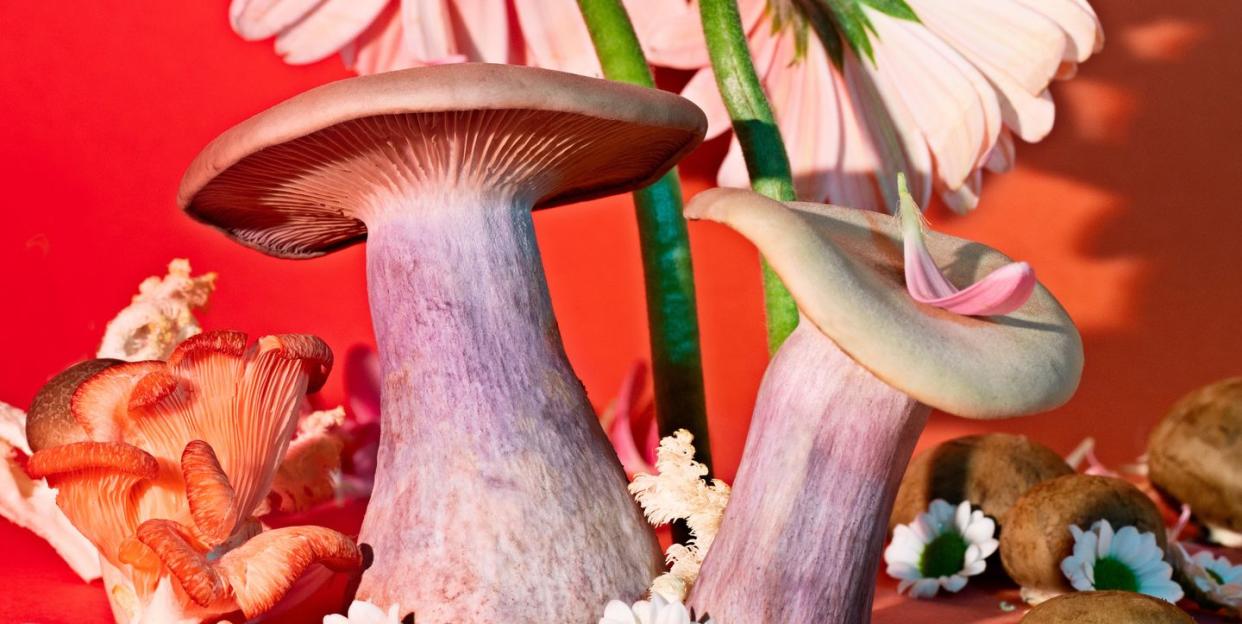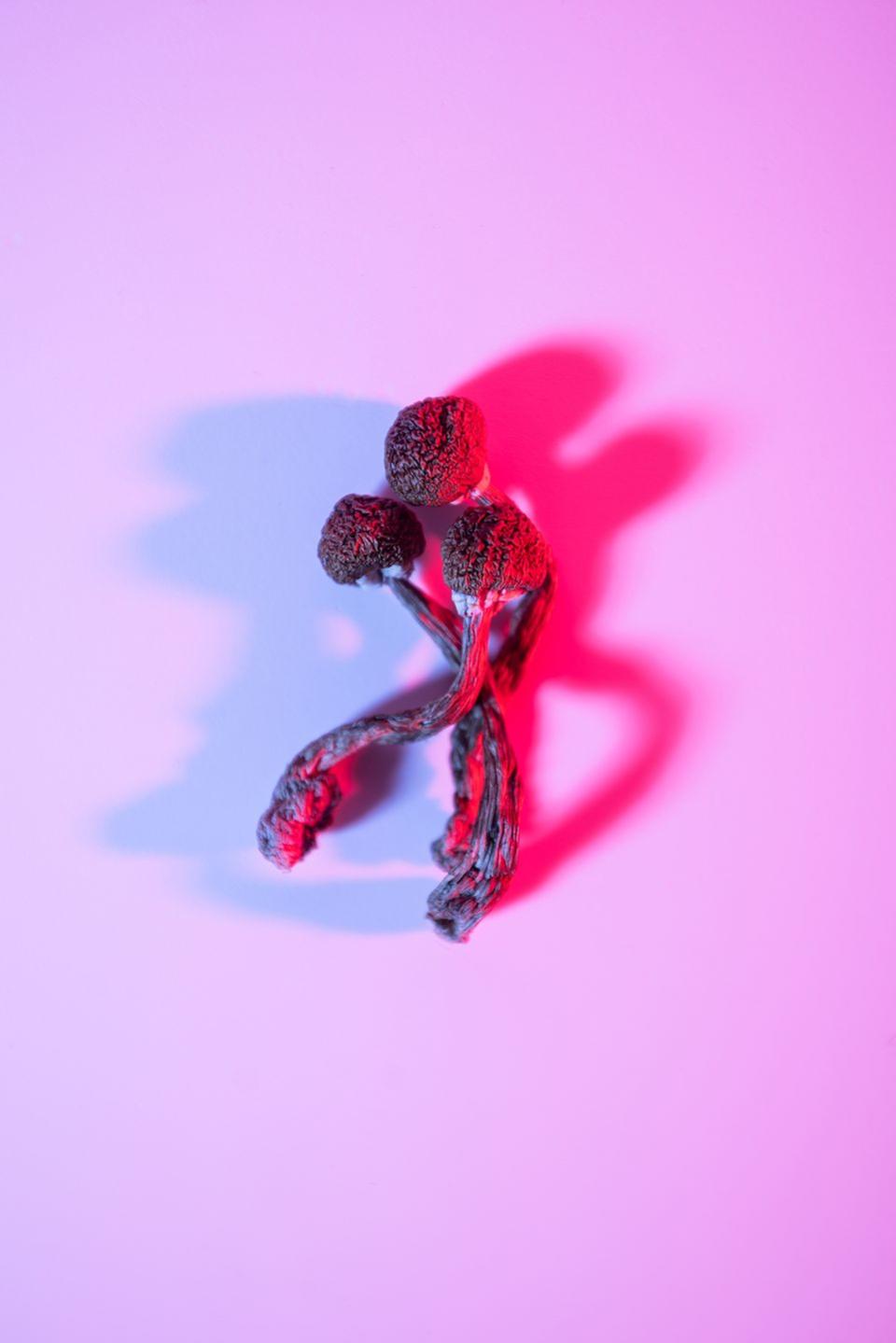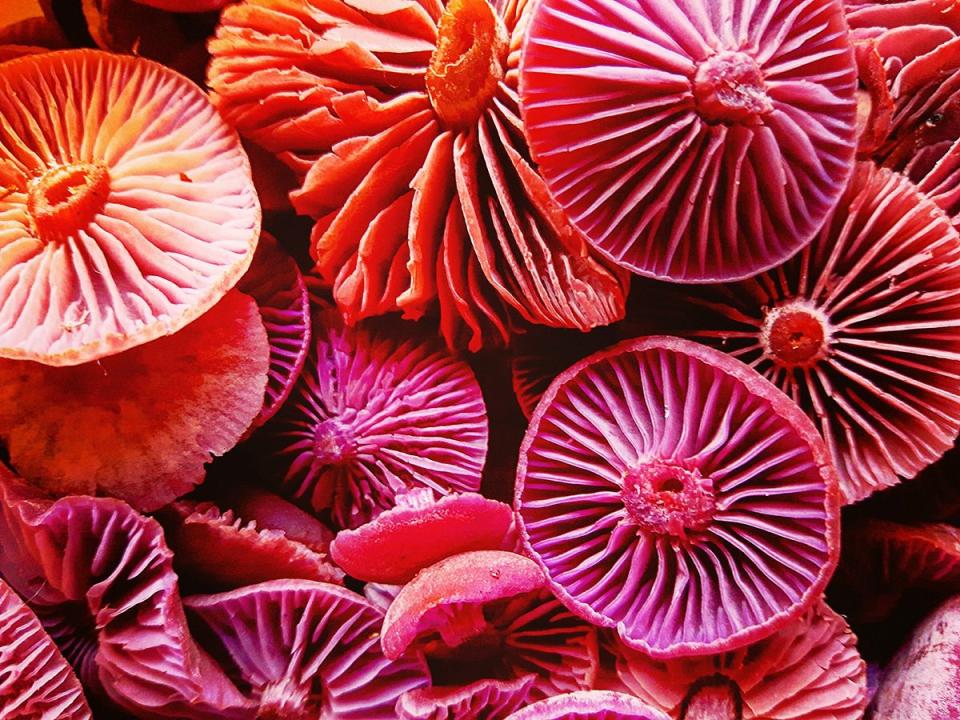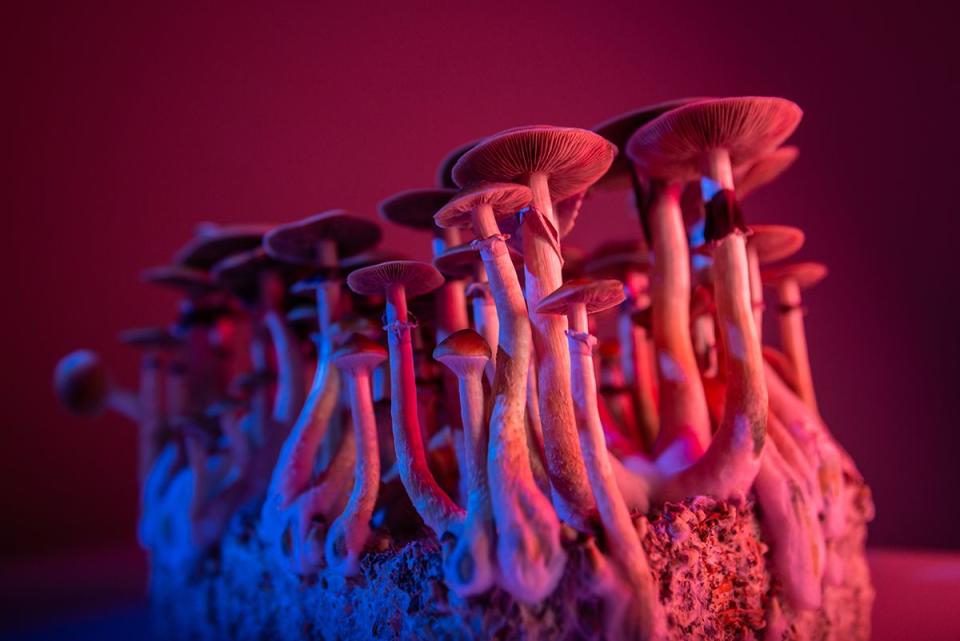Shrooms Are the New Cali Sober

"Hearst Magazines and Yahoo may earn commission or revenue on some items through these links."
I'd sunk into the leather couch after work for our usual “wine” down with my girlfriends. It was the type of gathering where we’d typically share a bottle (or two) of our favorite red, but instead on her vintage coffee table next to a glowing Trudon candle, I saw a ziploc baggie filled with magic mushrooms (slender gray stems with rust-colored caps) and a rainbow Willy Wonka-like shroom chocolate bar. Under nutritional info the label read, “INGREDIENTS: GOOD TIMES & LAUGHTER.”
I offered to pass the bottle of wine, but my friends declined and skipped the nightcap for a mushroom cap, assuring me they were “super mellow” if I wanted to try one. I wanted to be the cool girl who could ‘shroom on a whim, but I’m a pragmatic researcher at heart (hence my job as a reporter). Amused by the chocolate bar packaging, I snapped a pic and shared it to my Instagram stories. Within minutes, my DMs lit up with hearts and messages.
“Ze best! I’ve been microdosing mushrooms for the last year. Life changing,” one message read. “When I go out, I take them instead of drinking. I have more fun, I’m more giggly, there’s no hangover and I wake up feeling happier and more energized—never anxious and the opposite of depressed. I’ve gotten probably 15 of my friends on it and they all agree, it’s an easy way to cut down or cut out drinking altogether.”
Had morel support become the new aperol spritz?

Back in 2015, the Global Drug Survey found that 8.6 percent of respondents had used magic mushrooms. By 2021, this number had jumped to 16.1 percent. But most aren’t going on full-on hallucinogenic trips, rather they are microdosing mushrooms to lift their mood and energy levels, and many see it as a healthier vice than booze. “They just make you happy and you have a good time—it’s not like alcohol where you’re always needing more and chasing the buzz,” says a West coast hair stylist who started selling mushrooms about a year ago. “Most of my customers are young, female, working professionals like me,” she adds.
While the fungus may be trending now, our fascination with them is anything but new. Indigenous cultures around the world have been using magic mushrooms and other psychedelics for thousands of years for emotional, physical, and spiritual healing. Westerners began exploring their medical potential back in the 1950s, but were forced to abandon psychedelic research in the 60s—partly due to reckless use in young people and a backlash against the counterculture movement.
Forty years later, research is finally making a comeback and the results are promising. The FDA officially designated psilocybin (the hallucinogenic compound in magic mushrooms) as a “breakthrough therapy” for severe depression in 2018. Many scientists today see the drug as a new path forward in what’s been a frustrating dead end for mental health. “Treatment has been in a crisis for decades,” says Matthew Wayne Johnson, Ph.D. a professor in psychiatry and behavioral sciences at Johns Hopkins. “Lifespan is decreasing and the two big reasons for that are suicide and addiction—and when you step back and ask what areas psychedelic therapy, like psilocybin, has promising effects for early on, it’s things like depression, PTSD, alcohol, and tobacco.”
Doses given in therapeutic settings (aka macrodoses) are much larger than a typical recreational dose, and are closely monitored to make the patient feel safe and reassure them if anxiety comes up—which does occur in about a third of cases, says Dr. Johnson. The lasting effects from these sessions are hard to ignore: Talk therapy paired with two macrodoses of psilocybin may reduce heavy drinking by 83 percent, according to new research out of New York University. Another study in the Journal of Psychopharmacology found two macrodoses of the drug relieved major depressive disorder symptoms in adults for up to an entire year. And a smoking cessation study with psilocybin out of John Hopkins found a 67 percent abstinence rate after 12 months.

A theory as to why: Mushrooms stimulate neuroplasticity in the brain. “Psilocybin seems to make the brain more flexible and what you experience—your consciousness or what you’re thinking and feeling—more flexible,” says Dr. Johnson. “Regions in the brain that normally talk a lot will communicate less on psilocybin in favor of communicating with their distant neighbors more.” Meaning the brain makes connections and associations it doesn’t normally make. This causes a perspective shift that appears to reduce excessive rumination and self-focus, which may allow people to escape unhealthy thought patterns and behaviors.
If these macrodoses have such potential, it seems reasonable to wonder whether microdoses could have perks too. The growing wellness trend involves ingesting very small amounts of psychedelics (roughly 0.1 to 0.5 g), like magic mushrooms or LSD which won’t trigger hallucinations, but can give a burst of energy, creativity, and make the world feel like it’s in “high-def” in a way that benefits mood. That said, scientific research on the benefits of microdosing remains limited and results have been mixed. “At this time, there is no strong empirical support for [microdosing’s] effectiveness,” says Harriet De Wit, Ph.D. professor of psychiatry and behavioral neuroscience at the University of Chicago. “It is quite possible that the drug(s) have therapeutic potential, but currently most of our information comes from uncontrolled user reports.” Studies of microdosers that have shown improvements in mood, attention, and creativity are all self-reported—which means they can’t eliminate the placebo effect (i.e. the bias or expectation the person had that microdosing would make them feel better).

Julie Holland, MD a psychopharmacologist and author of Good Chemistry, says when compared to alcohol, the benefits are clear: mushrooms are anti-inflammatory, promote neuroplasticity, are non-toxic to the liver and brain (aka no hangovers), not particularly addictive, and because they don’t cause the munchies, there’s no added calories. But of course, she also notes that mushrooms are still illegal in 49 of 50 states, experiences can be heavily influenced by the setting or one’s mood, and it could be harder to stay safe in an altered state when you are “distracted by beautiful traffic lights.”
Although adverse effects do appear to be rare, reports indicate there is evidence that microdosing can damage the heart over time. According to the 2021 Global Drug Survey, more than 77 percent of respondents who had microdosed mushrooms in the last year reported no unwanted effects. The survey also found that people taking magic mushrooms needed less emergency medical treatment than those using other recreational drugs, including alcohol and cannabis. As of January 1st, Oregon became the first state in the U.S. to legalize the adult use of psilocybin; a similar law goes into effect in Colorado in 2024. That said, don’t expect to see ‘shroom dispensaries any time soon. These new laws don’t allow for retail sales of magic mushrooms, only onsite consumption (for those over 21) in a supervised setting with “certified mushroom facilitators.” (Those interested in other states do have the option of signing up for psilocybin clinical trials at clinicaltrials.gov.)
In the meantime, the mushroom black market is happy to fill in the voids. In addition to gummies and chocolates, you can find ‘shrooms freeze-dried, as teas, truffles, and capsules. Even venture capital firms have taken notice and are funneling money into startups developing psychedelic treatments—that aren’t even legal yet—for everything from PTSD and smoking cessation to headaches, traumatic brain injury, eating disorders and Alzheimer’s disease. “I often take it before the gym because it gives me energy,” says Laura, a micro-dosing business owner and mother of two in San Diego. She says before shrooms, alcohol was “the biggest crutch,” her go-to after a hard day. “Now with mushrooms my mind doesn’t even go there. Okay, I’ve a hard day? I’m gonna go home and take a bath and like go to bed early so I can wake up and go to the gym.”
And there are other perks, Laura says with a laugh: “I swear, if my kids ask ‘do you wanna craft?’ I’m like ‘no.’ But then I’ll eat some mushrooms and suddenly I’m Martha fucking Stewart.”
A version of this story appears in the April 2023 issue of ELLE.
You Might Also Like

